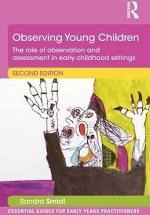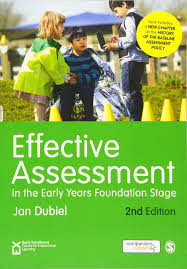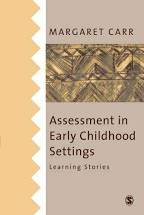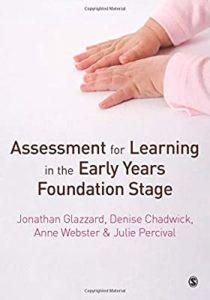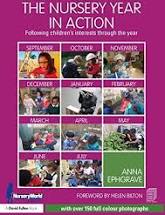
Observing Young Children
The role of observation and assessment in early childhood settings
S Smidt, (2015). Abingdon: Routledge.
Smidt offers us in the short compass of 90 small pages an introduction to the subject which makes reference to almost everything. The important names are all there: Piaget, Vygotsky, Bruner and so on. There is reference to sustained shared thinking, scaffolding and learning stories. Quite apart from being an introduction it is a great little book for refreshing the memory and giving the whole picture of observation and assessment.
Effective Assessment
Effective Assessment in the Early Years Foundation Stage
J Dubiel, (2014). London: SAGE.
This is an outstanding contribution to our literature on the subject. It is with reference in particular to the English statutory framework as is declared by the title, but it is much more than this. The fundamental principles of assessment are introduced and there are copious references that give a pointer to other valuable reading. Terms are carefully defined and there are case studies and examples of recording assessments. The latter includes the 2 year old progress check and the EYFS profile. The treatment of the subject is comprehensive.
Assessment in Early Childhood Settings
M Carr, (2001) . London: Paul Chapman.
This offering from an influential New Zealand writer has the potential to revolutionise one’s approach to observation and assessment. The idea of assessment to satisfy outside agencies and inspection is dismissed; and the tick box approach that measures a child’s attainment against a predetermined list of knowledge and skills called into question. Instead there is commended the positive acknowledgment of ‘learning dispositions’ observed in the child’s work. Then so very helpfully Carr introduces a ‘learning story’ method of narrative observation. (This is then taken up in a subsequent book: Carr M, Lee W, (2012), Learning Stories, London: Sage.)
Assessment for Learning
Assessment for Learning in the Early Years Foundation Stage.
J Glazzard, D Chadwick, A Webster, J Percival, (2010). London: Sage. The title of the book indicates that it is with specific reference to the English framework. It must also be noted that the 2008 EYFS that is assumed has been superseded so that many details are strictly out of date. For example, six learning areas have become seven. Nevertheless, the book is of continuing usefulness. The matter is presented as a student text book. It suggests specific reflection on the part of the reader. Theory is related in a clear and direct way to practice. great emphasis is laid on formative assessment as well as summative assessment. That is, it is about assessment for learning.
The Nursery Year in Action
Following children’s interests through the year. A Ephgrave, (2015). Abingdon: Routledge.
This is a thorough exploration of two-ness which adopts the imagery of a journey. It gives rise to very telling lines like: “What is important is that each moment is enjoyed as much as possible; that the landscape the child is in now is contemplated at leisure, rather than rushed through like a train en route to ‘school readiness’ terminus, stopping only at literacy central and numeracy junction!”
The authors help us to understand what it is like to be two (for most of the experience of our own two-ness is forgotten), and to respect these little people.

